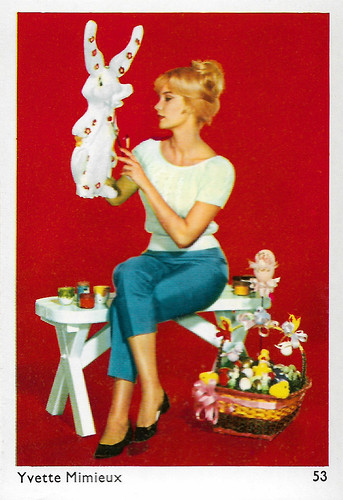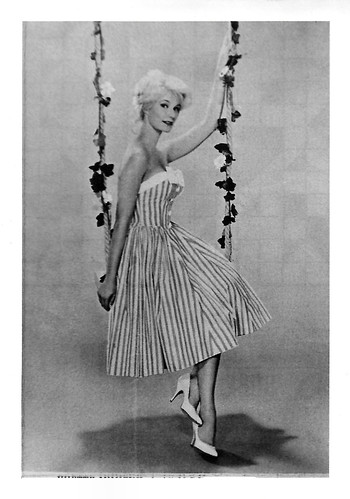
West-German collectors card, no. 53.

West-German postcard by Krüger, no. 902/370. Photo: Gérard Decaux.
800,000 years into the future
Yvette Carmen Mimieux was born in Los Angeles, California, in 1942. Her French father was René Mimieux and her Mexican mother Maria Montemayor. She has at least two siblings: sister Gloria and a brother.
The blonde, well-proportioned Mimieux was a beauty contest winner and model when talent manager Jim Byron suggested she become an actress. Her first acting appearances were in episodes of the television shows Yancy Derringer and One Step Beyond.
In 1960, she made her film debut, the Science Fiction film The Time Machine (George Pal, 1960). In George Pal's production of the H.G. Wells novel about time travel, Wells (Rod Taylor) travels 800,000 years into the future and falls for Weena (Mimieux) of the peaceful Eloi who are threatened by the Morlocks, cannibalistic mutations. The film was made for MGM, which put her under a long-term contract.
Her breakthrough role was followed by parts in Platinum High School (Charles Haas, 1960), with Mickey Rooney and Terry Moore, and the first beach-party movie, Where the Boys Are (Henry Levin, 1960) with George Hamilton.
Where the Boys Are was one of the first teen films to explore adolescent sexuality and the changing sexual morals and attitudes among American college youth. Aimed at the teen market, it inspired many American college students to head to Fort Lauderdale for their annual spring break.
MGM put Mimieux in the ingenue role in Four Horsemen of the Apocalypse (Vincente Minelli, 1961), an expensive flop. She had a central role in Light in the Piazza (Guy Green, 1962) with Olivia de Havilland, Rossano Brazzi, and George Hamilton, playing a mentally disabled girl. The film lost money but was well regarded critically.
She had a small part in The Wonderful World of the Brothers Grimm (George Pal, 1963), another commercial disappointment. Also later that year, she appeared in Diamond Head (Guy Green, 1963) for Columbia, billed second to Charlton Heston. She went to United Artists for Toys in the Attic (George Roy Hill, 1963), based on the play by Lillian Hellman and co-starring Dean Martin.
On TV, Mimieux guest-starred on two episodes of Dr. Kildare alongside Richard Chamberlain. Hal Erickson at AllMovie: "An appearance as a terminally ill girl on the 1964 Dr. Kildare episode 'Tyger Tyger' drew a great deal of press attention for Mimieux, principally because she spent most of her early scenes in a bikini. The actress's subsequent roles showed promise, but she generally found herself playing second fiddle to the leading man."
Mimieux made a cameo as herself in the comedy-musical Looking for Love (Don Weis, 1964) starring popular singer Connie Francis and played Richard Chamberlain's love interest in the romance Joy in the Morning (Alex Segal, 1965).

Small Dutch collectors card.

Small Dutch collectors card.
Unhappy with the "one-dimensional" roles offered to female actors
Post-MGM, Yvette Mimieux was in the Western The Reward (Serge Bourguignon, 1965) with Max von Sydow, the Disney comedy Monkeys, Go Home! (Andrew V. McLaglen, 1967) with Maurice Chevalier, and the heist film The Caper of the Golden Bulls (Russell Rouse, 1967) starring Stephen Boyd.
She was reunited with Rod Taylor in the action film Dark of the Sun (Jack Cardiff, 1968). Mimieux was top-billed in the hit Three in the Attic (Richard Wilson, 1969) with Christopher Lee, and appeared in the critically acclaimed film The Picasso Summer (Serge Bourguignon, Robert Sallin, 1969) alongside Albert Finney.
Mimieux was the female lead in the action film The Delta Factor (Tay Garnett, 1970), based on the 1967 novel by Mickey Spillane. She then had one of the leads in The Most Deadly Game (1970–1971), a short-lived TV series from Aaron Spelling.
Around this time Mimieux had a business selling Haitian products and she studied archeology and would travel several months of each year. In 1971 she sued her agent for not providing her with movie work despite taking money.
She was an air hostess in the disaster film Skyjacked (John Guillermin, 1972), starring Charlton Heston, and appeared in the Science-Fiction film The Neptune Factor (Daniel Petrie, 1973). By the early 1970s, Mimieux was unhappy with the 'one-dimensional' roles offered to female actors: "There's nothing to play. They're either sex objects or vanilla pudding.
Mimieux had been writing for several years, mostly journalism and short stories. She wrote a thriller, which she took to producers Aaron Spelling and Leonard Goldberg, who then produced it for ABC as a television film. It aired as Hit Lady (Tracy Keenan Wynn, 1974). Hal Erickson at AllMovie: "she is undeniably impressive as a scantily clad professional assassin".
Mimieux starred in The Legend of Valentino (Melville Shavelson, 1975), in which she played Rudolph Valentino's (Franco Nero) second wife, Natacha Rambova. Also in 1975, she made the Canadian thriller Journey into Fear (Daniel Petrie, 1975), a remake of the spy film Journey into Fear (Norman Foster, 1943) starring Orson Welles.
Mimieux was a falsely imprisoned woman victimised by a sadistic guard in the exploitation film Jackson County Jail (Michael Miller, 1976) with Tommy Lee Jones. The 'drive-in' film has become a cult film and was selected by Quentin Tarantino for the first Quentin Tarantino Film Festival in Austin, Texas, in 1996.
Mimieux co-starred in the first PG-rated Walt Disney Productions feature, The Black Hole (Gary Nelson, 1979) starring Maximilian Schell and Anthony Perkins. She had the lead as the chief executive of a giant corporation called "Mystique" in Circle of Power (Bobby Roth, 1981).
She appeared in several TV movies and guest-starred on The Love Boat (1984), Lime Street (1985), and Perry Mason: The Case of the Desperate Deception (1990). Her last appearance was in the TV mini-series Lady Boss (Charles Jarrott, 1992), based on a novel written by Jackie Collins. After this role, she retired from acting.
Yvette Mimieux married three times. In 1959, she married Evan Harland Engber but kept the marriage secret for almost two years. She was married to film director Stanley Donen from 1972 until their divorce in 1985. In 1986, Mimieux married Howard F. Ruby, chairman emeritus and founder of Oakwood Worldwide.

German postcard by Krüger, no. 902/254. Photo: Yvette Mimieux and James Darren in Diamond Head (Guy Green, 1963).

Romanian postcard by Casa Filmului Acin, no. 90.
Sources: Hal Erickson (AllMovie), Wikipedia, and IMDb.
No comments:
Post a Comment